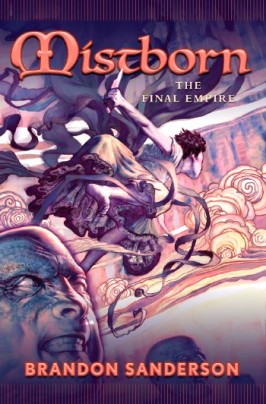I’ll jump right into it: Well of Ascension didn’t impress me like The Final Empire did. Sometimes, you have to wonder how serial authors muster the courage to release a book after producing such a hit. Well of Ascension was still early in Sanderson’s career, so it’s fathomable that Final Empire’s success had him (and his editors) a little starstruck. The timeline for Well of Ascension could have been shorter too; maybe it didn’t get the same editorial treatment Final Empire did. But regardless of the reason, the second installment of the Mistborn trilogy fell flat. (Spoilers ahead! Like, immediately ahead. Don’t read on if you’re not prepared.)
Unlike the first book, Well of Ascension focuses more on the politics of creating a kingdom (and eventual empire) and less on kicking Obligator/Inquisitor tail. Compared to The Final Empire, this book could almost be described as a snoozefest. There’s so much political drama that I found myself wanting to get to the “good” parts—e.g., the action parts—of which there were disappointingly few. The few that are there, thankfully, are gripping and exciting, but the book toes the line between “this book is quieter than the last one, but still interesting” and “there’s not enough fightin’.”
Vin, who takes up the mantle as resident Mistborn in Luthadel after Kelsier’s death, has a distinct lack of agency in this book. To some extent, her lack of agency is a main and explicit struggle in the novel, but when she does reclaim her agency and her free will, she completely loses control. All of a sudden, doing things “her way” means killing dozens of people in near-cold blood. This is in no small part due to a rival Mistborn egging her on, but I wish she had shown more awareness. More propriety.
While Vin’s character arc doesn’t quite deliver, Elend’s is very well done. In book 1, Elend is little more than an unkempt philosopher; in book 3, Elend is a successful and frightening emperor. The transition between the two is well paced (Sanderson does a bit of hand holding during the process, eager to draw attention to Elend’s progress in the narration itself) and ultimately believable.
Also, I kept track of how many times the characters sighed in Well of Ascension. I didn’t manage to count them all; I grew bored about halfway through. But still, the characters racked up fifty sighs by the time I was at page 200. That’s way too many. I keep ragging on Sanderson for this admittedly minor flaw in his writing, but I’m honestly surprised that it escaped editors at Tor twice. (Three times, actually, since the characters in The Hero of Ages sigh a lot too.)
The Well of Ascension is an average book. I didn’t hate it, but I didn’t love it. I’m sure there are many people content to read no further than The Final Empire. I don’t begrudge them for that choice. An average book gets an average score of 3/5 stars. Honestly, I’m not surprised that the second book isn’t as good as the first. It’s a well-known occurrence for volume 2 of a book series or TV series or movie series to lack that essential spark of the first volume, the thing that made people want a second installment in the first place. It’s a good thing that Words of Radiance doesn’t suffer the same problem…
 When I first read Brandon Sanderson’s Mistborn trilogy six years ago, I spent an entire summer weekend reading in my room. I went through a book a day and only came out to say hello to my family, scrounge for food, and use the restroom. I’m not even sure I changed out of my pajamas that weekend. The Final Empire was my first Sanderson novel, and was actually one of the first adult fantasy books I’d ever read. (Alison Croggon’s The Naming was my first “adult” fantasy novel, but it always felt a little YA to me.)
When I first read Brandon Sanderson’s Mistborn trilogy six years ago, I spent an entire summer weekend reading in my room. I went through a book a day and only came out to say hello to my family, scrounge for food, and use the restroom. I’m not even sure I changed out of my pajamas that weekend. The Final Empire was my first Sanderson novel, and was actually one of the first adult fantasy books I’d ever read. (Alison Croggon’s The Naming was my first “adult” fantasy novel, but it always felt a little YA to me.)